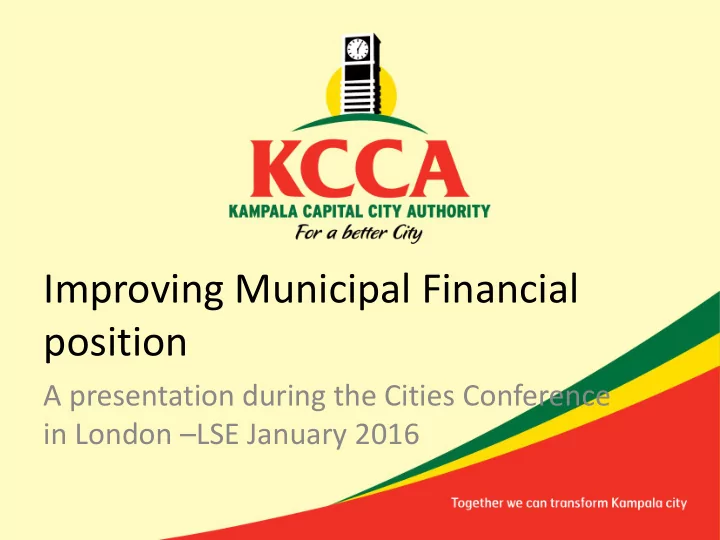

Improving Municipal Financial position A presentation during the Cities Conference in London – LSE January 2016
KAMPALA- UGANDA’S STRATEGIC LOCATION FACTFILE: • KAMPALA - UGANDA CAPITAL CITY • COVERS 192 SQUARE KMS, • 1.57 MILLION NIGHT POPULATION • DAY POPULATION ESTIMATED AT 4.0 MILLION PEOPLE • RESIDENT POPULATION PROJECTED TO BE 3.1 MILLION IN 10YRS • ACCORDING TO 2012 KPDP,ONLY 23 % IS FULLY URBANISED,60% PERI-URBAN AND 17% RURAL 2
Background Prior to 2011 restructuring of KCC, Financial management was Characterized by; Huge non current liabilities estimated at over USD 14.544Million as at 30 th a) June 2010. b) Delayed settlement of suppliers due to cash flow management challenges. c) Poor budget performance management system. Contractual and expenditure commitments were entered into without due consideration to work plans and budget. d) Huge revenue arrears portfolio (Est at USD 29.4 Million) that was attributed to weak, manual and corrupt revenue collection and enforcement regime. e) Poor cash and bank management practices with 151 unreconciled bank accounts. f) Low levels of Local revenue collections (approx. USD 9Million in June 2011) g) Low levels of Central Government funding(Approx. USD 16 Million as at June 2011) h) Absence of clear operating manuals(Financial and accounting policies) i) A dysfunctional and un updated asset register USD 13.6 Million was reported in the financial records as at June 2011 without supporting schedules
Financial management reforms • KCCA Introduced Fiscal structural reforms in an effort to improve institutional operations and build confidence in the various stakeholders: a) Recruited competent staff in the Treasury Department b) Re-engineered and Automated Revenue business processes. c) Set up Arrears recovery programs. d) Establishment of an asset register e) Robust cash flow planning and budget management. f) Reviewed cash and bank management arrangements g) Putting in place policy and procedure manuals to guide financial operations
Results of the Financial Structural reforms: • All inherited non current liabilities have been settled. • Increased Central Gov’t funding to KCCA ( GoU grants and Donor support as at June 2015 stood at USD 42.5Million & USD 27 Million respectively) • Growth in Asset register to USD 173 Million(June2015) from USD 13.6 Million(June 2011). • Prudent cash management system which resulted into the closure of multiple bank accounts. • Established City Fiscal policy to guide funds allocation • Un-qualified audit report Key Area of Concern: How can cities improve allocative efficiency in municipal spending to create a favorable municipal fiscal space?
Achievements cont’d: REVENUE MOBILISATION TREASURY MGT Local revenue has DOMESTIC REVENUE COLLECTION (UGX Bn) increased from 120 UGX30bn(US$10mn) in 2010/11 to 100 UGX82bn(US$30mn) in 80 2014/2015 and projected 60 to 111.8bn in 2015/2016. 40 Key Concern: 20 How can we estimate the municipal revenue potential 0 and the associated level of tax compliance 6
Key concerns under Land and Property Tax • Property rates have continued to perform below the capacity. Because of exemption of owner – occupied premises contributing about 53 % of all eligible properties. • The National Revenue Agency collects Property tax from the sale or rent of property, Cities collect ground rate, Property rates, lease premiums etc. • Other cities are introducing Land value capture as another tax source Key concern: • How can we avoid tax proliferation and improve affordability and efficiency? • Which level of Government should generate which type of revenue? • What is the potential for Land value capture as a source of revenue for African cities?
Central Government Transfers • Central Government transfers are mainly in form of Conditional grants that are tied to different vote functions which are usually not in sink with the realities at sub- national level. Limited flexibility has affected allocative efficiency. In Uganda over 84% is allocated to operation ,leaving only 16% for capital development. Key concern: How can Intergovernmental transfers improve the capacity of sub-national to deliver public services and how can the coordination of different government levels be improved?
Alternative Financing Mechanisms • The Low levels of central government transfers and low levels of local revenue have resulted in a significant funding gap. Many cities are looking for other Alternative financing mechanisms to close the Gap. • Different cities are at different levels in attracting funds from the capital Market with varying experiences; Key Concerns: When should sub-nationals pursue debt as an alternative form of financing, including borrowing from the capital Markets? What are the costs, risks and prospects of issuing a sub-national bond in developing countries? Is there a role for Business Special Purpose Vehicles owned by sub- national Government in delivering public services?
Alternative Financing Mechanisms-PPPs • The Gov’t of Uganda approved the national PPP policy in 2007 and the PPP act has been enacted in 2015, opening the public sector to private capital financing. In KCCA a number of Pipeline Projects have been identified for financing. Key concerns: How can sub-nationals in developing countries ensure that PPPs add value for money? What are the experiences with different PPP models. How can sub-national explore the optimal service delivery options , In Africa the focus is on PPP , in the West there is a strong move towards municipalisation of services? How can we learn from the experiences in the west
In conclusion Increasing Municipal finance resource provision needs to be taken in context. The overall concern today is whether Rapid urbanisation in developing countries should influence political or fiscal decentralisation. Given the widening infrastructure deficit and increased demand for services? Is time ripe for a municipal fiscal agency synonymous with the IMF (FAD) specifically for developing countries?
Thank You and Welcome to Kampala 1 2
Recommend
More recommend